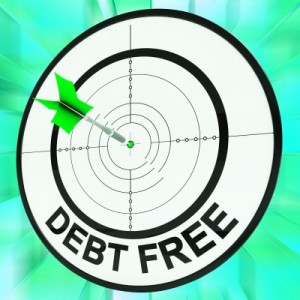 It can easily happen. Whether we’re trying to keep up with the Joneses or investing in our education, sometimes debt can add up quickly. The good news is that debt can be erased. However, sometimes what we know we need to do is different from actually doing it. Here’s a game plan to start chipping away at your outstanding debt. With time and persistence, we can eliminate debt and increase our net worth.
It can easily happen. Whether we’re trying to keep up with the Joneses or investing in our education, sometimes debt can add up quickly. The good news is that debt can be erased. However, sometimes what we know we need to do is different from actually doing it. Here’s a game plan to start chipping away at your outstanding debt. With time and persistence, we can eliminate debt and increase our net worth.
Let’s start with some definitions of debt. Debt is debt, but there is some that is generally better than others. Mortgage debt isn’t considered bad debt (unless you bought more house than you can afford). Additionally, student loan debt isn’t terrible (as you’re investing in human capital), but interest rates can be higher than home debt. Vehicle debt isn’t great either. Pay cash for your vehicles. Credit card debt is bad. It’s debt that has no backing, no assets. Interest on many cards is deplorable as well. Generally, it’s wise to reduce your credit card debt first (as it’s usually the highest interest) followed by student debt, vehicle debt, etc.
Start first on where you’re spending your money. With a sheet of paper, make two lists. On the left hand side, title this list “Needs”. On the right hand side, title this list “Wants”. Generally, your wants will dwarf your needs. In this step, be honest with what your needs really are. For most people the basics are going to be shelter, food (not dining out), clothing, water, and utilities.
Grab last year’s bank statement and circle or highlight all of the needs. This will be mortgage/rent, groceries, utilities such as water and electricity, insurance and needed (not excess) clothing.
Now, start on the lists of wants. But instead of making a list from the top of your head, start going through your statements and listing the “wants” as they appear from what you spent. Items such as car payment, dining out, smartphone, coffee, TV/cable, etc., should be put down on the list of wants.
From there, determine what wants you’re spending money on that can be given up in order to reduce your debt. If you find you’re spending quite a bit dining out, consider taking that money and putting it toward your debt. The key becomes prioritizing. It’s not uncommon (and in fact, it’s quite easy) to find a few hundred dollars extra every month to plow into your debt.
Doing this exercise accomplishes a few things. First, it reduces your debt and builds your net worth. It also changes your habits and priorities. It forces you to think about your spending and whether or not a contemplated purchase will add any value to your life. It also provides guaranteed, risk-free returns. By eliminating debt you are saving a ton of money in interest payments, effectively giving that return to yourself instead of a creditor.
Finally, it changes your habits. The good news is that once the debt is paid off, you can still treat the payments you were making as a bill. Only now, you’re going to pay yourself first. For example, let’s say you’ve been making an extra $400 payment to pay off your vehicle or credit cards. Once they’re paid off, take that $400 and put it in your emergency fund, IRA or 401k. And keep making the payments. The good news is that you’ve already budgeted for it, only now the money goes in your pocket.


 Sterling Raskie, MSFS, CFP®, ChFC®
Sterling Raskie, MSFS, CFP®, ChFC® The latest in our Owner’s Manual series, A 401(k) Owner’s Manual, was published in January 2020 and is available on
The latest in our Owner’s Manual series, A 401(k) Owner’s Manual, was published in January 2020 and is available on  A Medicare Owner’s Manual, is updated with 2020 facts and figures. This manual is available on
A Medicare Owner’s Manual, is updated with 2020 facts and figures. This manual is available on  Social Security for the Suddenly Single can be found on Amazon at
Social Security for the Suddenly Single can be found on Amazon at  Sterling’s first book, Lose Weight Save Money, can be
Sterling’s first book, Lose Weight Save Money, can be  An IRA Owner’s Manual, 2nd Edition is available for purchase on Amazon. Click the link to choose the
An IRA Owner’s Manual, 2nd Edition is available for purchase on Amazon. Click the link to choose the  Jim’s book – A Social Security Owner’s Manual, is now available on Amazon. Click this link for the
Jim’s book – A Social Security Owner’s Manual, is now available on Amazon. Click this link for the  And if you’ve come here to learn about queuing waterfowl, I apologize for the confusion. You may want to discuss your question with Lester, my loyal watchduck and self-proclaimed “advisor’s advisor”.
And if you’ve come here to learn about queuing waterfowl, I apologize for the confusion. You may want to discuss your question with Lester, my loyal watchduck and self-proclaimed “advisor’s advisor”.